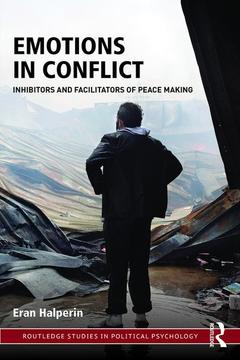Description
Emotions in Conflict
Inhibitors and Facilitators of Peace Making
Routledge Studies in Political Psychology Series
Author: Halperin Eran
Language: English
Subjects for Emotions in Conflict:
Keywords
Political Psychology; Eran Halperin; Ethnic Conflict; Emotion; Emotion Regulation; Intergroup Conflicts; Conflict Resolution; Peace Studies; Social Psychology; Intractable Conflicts; Van Kleef; American Psychiatric Association; Humanitarian Aid; Future Vitality; Emotion Regulation Processes; Intergroup Conflict; Intergroup Emotions; Outgroup Members; Intergroup Anger; Core Appraisal; Intergroup Empathy; Emotion Regulation Strategies; De Dreu; Emotional Goals; Intergroup Reconciliation; Intergroup Hatred; Collective Pride; Collective Angst; Low Power Groups; Military Intelligence; Military Intelligence Agencies; Experience Empathy; TMT Study
Publication date: 12-2015
· 15.2x22.9 cm · Paperback
Publication date: 12-2015
· 15.2x22.9 cm · Hardback
Description
/li>Contents
/li>Readership
/li>Biography
/li>
Social and political psychologists have attempted to reveal the reasons why individuals and societies that acknowledge that peace would improve their personal and collective well-being, and are aware of the required actions needed to promote it, are simply incapable of making this step forward. Some social psychologists have advocated the idea that certain societal beliefs and collective memories about the nature of the opponent, the in-group, the history, and the current state of the conflict distort the perceptions of society members and prevent them from identifying opportunities for peace. But these cognitive barriers capture only part of the picture.
Could identifying the role of discrete emotions in conflicts and conflict resolution potentially provide a wide platform for developing pinpoint conflict resolution interventions?
Using a vast array of primary sources, critical literature analysis, and firsthand personal experiences in various conflict zones (Middle East, Cyprus, Bosnia, and Northern Ireland), Eran Halperin introduces a new perspective on psychological barriers to peace. Halperin focuses on various emotional mechanisms that hamper peace processes, even when parties face real opportunities for conflict resolution. More specifically, he explores how hatred, anger, fear, angst, hope, despair, empathy, guilt, and shame, combined with various emotion regulation strategies, provide emotions-based explanations for people's attitudinal and behavioral reactions to peace-related events during the ongoing process of conflict resolution.
Written in a clear and accessible style, Emotions in Conflict offers a thought-provoking and pioneering insight into the role discrete intergroup emotions play in impeding, as well as facilitating, peace processes in intractable conflicts. This book is essential reading for those who study intractable conflicts and their resolutions, and those who are interested in the ?real-world? implication of recent theories and findings on emotion and emotion regulation.
Table of Contents: 1. Introduction 2. The Emotion Based Approach to Conflict Resolution – Some Basic Concepts 3. Intergroup Hatred in Intractable Conflicts – The Ultimate Barrier to Peace 4. Intergroup Anger in Intractable Conflicts – Not Exactly What You Had in Mind… 5. Societies under Threat – Collective Fear and Angst as Barriers and (at Times) Catalysts of Peace 6. Is Peace Really an Option? Hope, Despair and the Peace Process 7. Moral Emotions in Intractable Conflicts: Group-Based Guilt, Conflict Resolution and Reconciliation 8. Empathy as a Peace Catalyst in Intractable Conflict: Is It Feasible? Is It Enough? 9. The "Catch 22" of Intractable Conflicts: The Role of Pride and Humiliation in Conflicts and Peace Processes 10. Changing Feelings to Promote Peace: Emotion Regulation as a New Path to Conflict Resolution
Eran Halperin is currently an associate professor and the active dean of the School of Psychology at the Interdisciplinary Center, Herzliya, Israel. His research uses psychological and political theories and methods to investigate different aspects of intergroup conflicts. More specifically, he is interested in widening our understanding on the emotional roots of some of the most destructive political ramifications of intergroup relations.




